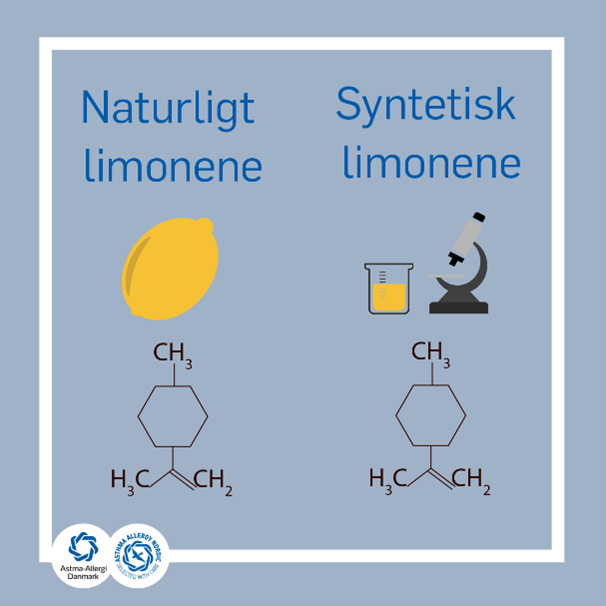Natural ingredients may also cause allergies
That a product consists of ‘natural ingredients’ is not the same as to say that the product is an allergy-friendly choice. Asthma-Allergy Denmark's allergy labelling is your guide to a safe choice in relation to skin allergies – also when it comes to natural ingredients.
Natural ingredients originate from nature and are often complex mixes of many different chemical substances. The content and amount of the chemical substances in natural ingredients may vary, depending on where the natural ingredient stems from, when it was harvested, and which part of the plant the ingredient comes from.
When we label natural ingredient products, we look at whether the natural ingredient may contain allergens. If so, we demand that those allergenic substances be removed before the natural ingredient may be part of a product with our label. The fact that the problematic substances in a natural ingredient have been removed cannot be seen from the list of ingredients – neither for products with our label nor for others.
But our label is your guarantee that the natural ingredients have been thoroughly reviewed. It is not possible to remove the allergenic substances from all natural ingredients. If they cannot be purified, we do not allow the ingredients in products with our allergy label.
With Asthma-Allergy Denmark's allergy label, you will therefore be safe, also in relation to protecting yourself and your family from substances with a special risk of allergy that may be hidden in the natural ingredients.

Many consumers believe that natural ingredients are a better choice. But many substances that are extracted from nature, such as limonene, may actually be produced in exactly the same way in a laboratory. The substances are built up in the same way and are chemically exactly the same. This means that if one substance can cause allergies, so can the other. Synthetic ingredients are often produced in pure form and usually contain fewer chemical substances than the natural ones. Therefore, it is not necessary to purify the synthetic substances in order to avoid substances with a special risk of allergy.
Thus, it not necessarily a good allergy-friendly alternative to choose products with natural ingredients. The same is true if you want to prevent allergies.
Below you can learn about a number of natural ingredients that contain allergenic substances – some can be approved by Asthma-Allergy Denmark's allergy labelling after purification, while others cannot. In our database, Kemilex, you will always find our evaluation of the ingredients we have assessed.
Aloe Vera (Aloe barbadensis) contains the allergenic substances anthraquinones. In allergy-labelled products, we demand that the amount of anthraquinones be minimal. The manufacturers must therefore document that the allergenic substances have been removed.
Marigold (Calendula officinalis) is – among other things -- used to add fragrance to a product, which is not allowed in products with Asthma-Allergy Denmark's allergy labelling. In addition, marigold may also contain the allergens sesquiterpene lactones.
Mango (Mangifera indica) indeholder det allergifremkaldende stof urushiol. Det er det samme allergen, som findes i giftig efeu. Vi tillader ikke ingredienser, som indeholder urushiol.
Sunflower seed oil (Helianthus Annuus Seed Oil) may contain contaminants with sesquiterpene lactones which are allergenic. In order to limit the amount of sesquiterpene lactones in products with Asthma-Allergy Denmark's allergy labels, we demand that the sesquiterpene lactones have been removed.
Propolis is a kind of resinous substance that worker bees produce on the basis of, amongst other things, resin from spruces. However, propolis contains a wide range of allergens, such as a number of perfume substances and rosin. For this reason, we do not allow propolis in products with Asthma-Allergy Denmark's allergy labels.
Peru balsam is the juice from the bark of the tree Myroxylon pereirae from Central America. Peru balsam contains perfumes. Perfume substances are not allowed in products with our allergy labelling, and therefore Peru balsam is not allowed as an ingredient either.
Almond oil (Prunus amygdalus kernel oil) may contain small amounts of allergenic benzaldehyde. The amount of benzaldehyde is greatest in bitter almonds. To limit the amount of the allergen in products carrying The Blue Label or the label of Asthma Allergy Nordic, manufacturers must document that the ingredient comes from sweet almonds and that the content of benzaldehyde in the oil has been removed before we allow its use.
